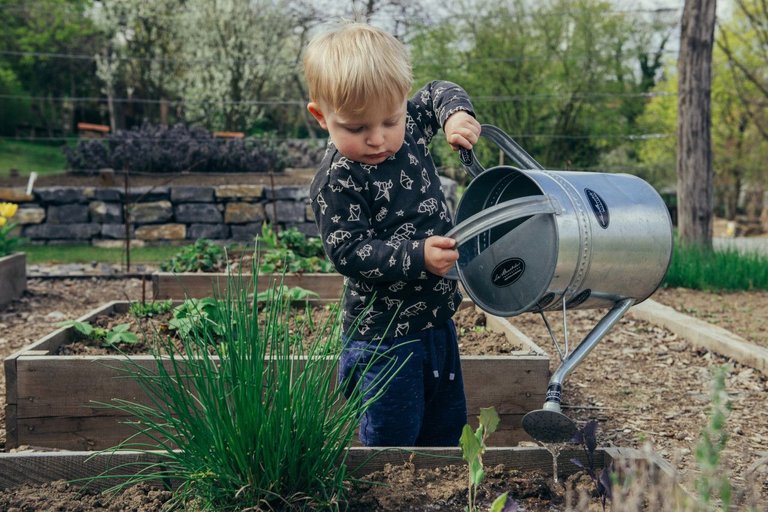Help your children to be resilient

Some time ago someone sent me an email to thank me for my post - Seahorse. I admit it, the feeling of knowing that what I do is useful to someone is incredible, but that's another topic. In the email, the reader also took the opportunity to ask me to expand a little more on the subject and to add some tips that could help her foster resilience in her children. I gladly agreed and shared some of the things my wife and I have practiced with our children over the years. Today I would like to share with you exactly those same tips.
Talking about resilience and training individuals and/or groups about it is one of the things I enjoy the most. It's obviously a huge topic and it's impossible to cover everything in one post, but today I want to share with you just four essential tips that can help children – and ourselves – develop a resilient character.
1. Give your children responsibilities. Every child will reap the benefits of learning to be responsible for the rest of their life. Responsibilities can range from cleaning your room, taking out the garbage, helping to set or clear the table, washing the car every week, sweeping the house, etc. One of the sayings we often use at home is – Life is not an amusement park. Obviously not everything in life is work, but it is healthy to learn at an early age that everything in life has a price and that someone will not always do things for us. I remember that when I was little, I often grumbled about having to do my chores. I couldn't understand the pedagogical purpose of it. My mom in her peculiar way used to tell me – I will not always be there to do things for you. That was one of the best lessons I learned in my life.
2. Not giving children everything they want or ask for. True, as parents we always want the best for our children. We want to prevent them from suffering the vicissitudes that we had. It is true that we are providers and our children depend on us for practically everything, but one of the greatest harms we can do to them is to give them everything on a silver platter. Receiving everything immediately and at no cost encourages not only laziness but also selfishness and narcissism. A child who receives everything without limits will most likely become a parasite in society and will likely develop sociopathic tendencies. It is good that they understand at an early age that we cannot always have everything we want and that it is necessary to differentiate between what we want and what we need.
3. Practice a sport or a manual and creative hobby. Playing a sport helps – among other things – to develop persistence and teamwork. It also teaches us that to achieve victory or the first place you have to work hard and train, but also that sometimes we will fail. Those defeats are probably the best teachers for building resilience. In other words – if we fail today, tomorrow we will have the opportunity to try again. Life is full of challenges and it is healthy to recognize at an early age that we will experience defeat in our quest for victory. In relation to manual and creative hobbies; One of the main benefits – in addition to the creative and motor skills – is that they help us learn to finish what we start.
4. Let's be a daily example for them. It is no secret to any of us that our children do not necessarily do what we tell them to do but what we model in front of them. If you want your children to develop resilience, then your example is your most powerful tool to achieve it. If they see that you are responsible, that you finish what you start, that you are disciplined, that you do not throw in the towel when things get hard and that you get up when you fall, and that you continue despite the circumstances in order to achieve your goals; that is what will powerfully impact their lives and help them to be resilient.
Photo by Filip Urban on Unsplash
Ayuda a tus hijos a ser resilientes

Hace tiempo alguien me envió un correo electrónico para agradecerme por mi publicación – Caballito de mar. Lo admito, la sensación de saber que lo que hago le sirve a alguien es increíble, pero eso es otro tema. En el correo electrónico la lectora aprovechó también para pedirme que yo expandiera un poco más sobre el tema y que añadiera algunos consejos que le pudieran ayudar a fomentar la resiliencia en sus hijos. Con gusto accedí y le compartí algunas de las cosas que mi esposa y yo hemos practicado con nuestros hijos a través de los años. El día de hoy me gustaría compartir con ustedes precisamente esos mismos consejos.
Hablar sobre la resiliencia y entrenar a individuos, y/o grupos al respecto es una de las cosas que más disfruto. Obviamente es un tema muy grande y es imposible abarcar todo en una sola publicación, sin embargo hoy quiero compartir con ustedes sólo cuatro consejos esenciales que pueden ayudar a los niños – y a nosotros mismos – a desarrollar un carácter resiliente.
1. Da responsabilidades a tus hijos. Todo niño cosechará los beneficios de aprender a ser responsable por el resto de su vida. Las responsabilidades pueden ir desde asear su cuarto, sacar la basura, ayudar a poner o recoger la mesa, lavar el coche cada semana, barrer la casa, etc. Una frase que utilizamos a menudo en casa es – La vida no es un parque de diversiones. Obviamente no todo es trabajo en la vida, pero es saludable aprender a temprana edad que todo tiene un precio en la vida y que no siempre alguien hará las cosas por nosotros. Recuerdo que cuando yo era pequeño muy seguido refunfuñaba por tener que realizar mis quehaceres. No podía entender el fin pedagógico de ello. Mi madre a su manera peculiar solo me decían – No siempre estaré ahí para hacer las cosas por ti. Esa fue una de las mejores lecciones que aprendí en mi vida.
2. No dar a los hijos todo lo que quieren o piden. Cierto, como padres queremos siempre lo mejor para nuestros hijos. Queremos evitarles que sufran las vicisitudes que nosotros tuvimos. Es cierto que somos proveedores y nuestros hijos dependen de nosotros prácticamente para todo, pero uno de los mayores daños que podemos hacerles es darles todo en bandeja de plata. Recibir todo inmediatamente y sin costo alguno fomenta no solo la holgazanería sino también el egoísmo y el narcisismo. Un niño que recibe todo sin limites muy probablemente se convertirá en un parásito de la sociedad y probablemente desarrollará tendencias sociópatas. Es bueno que ellos entienda a temprana edad que no siempre se puede tener todo lo que uno quiere y que es necesario diferenciar entre aquello que se quiere y aquello que se necesita.
3. Practicar un deporte o pasatiempo manual y creativo. Practicar un deporte ayuda – entre otras cosas – a desarrollar la persistencia y el trabajo en equipo. También nos enseña que para alcanzar la victoria o el primer lugar hay que esforzarse y entrenar, pero también que en ocasiones fracasaremos. Son esas derrotas probablemente las mejores maestras para desarrollar resiliencia. En otras palabras – si hoy caemos mañana tendremos la oportunidad de intentarlo de nuevo. La vida está llena de retos y es saludable reconocer a temprana edad que experimentaremos derrotas en nuestra búsqueda de la victoria. En relación a pasatiempos manuales y creativos; uno de los beneficios principales – además de los elementos creativos y motrices – es que nos ayudan a aprender a terminar lo que comenzamos.
4. Seamos un ejemplo diario para ellos. No es ningún secreto para nadie de nosotros que nuestros hijos no hacen necesariamente lo que les decimos que hagan sino lo que modelamos delante de ellos. Si quieres que tus hijos desarrollen resiliencia entonces tu ejemplo es tu herramienta más poderosa para lograrlo. Si ellos ven que tú eres eres responsables, que terminas lo que comienzas, que eres disciplinado, que no tiras la toalla cuando sufrimos una derrota y que te levantas cuando caes, y que continuas a pesar de las circunstancias con el fin de lograr tus metas; eso es lo que impactará sus vidas poderosamente y les ayudará a ser resilientes.
Photo by Filip Urban on Unsplash







